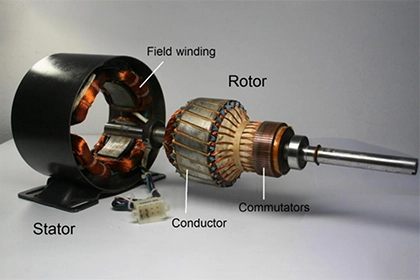
Which motor is most widely used and why?
Motors are essential components in various industries and applications, powering machinery, appliances, and vehicles. When it comes to determining the most wide
Motors are essential components in various industries and applications, powering machinery, appliances, and vehicles. When it comes to determining the most widely used motor, several factors come into play, including performance, efficiency, reliability, and cost-effectiveness. In this article, we will explore different types of motors and identify the motor that holds the title for being the most widely used.
I. Overview of Motor Types
Before delving into the most widely used motor, let's briefly examine some of the common motor types:

AC Induction Motors
AC induction motors are robust, reliable, and widely used in various industrial applications. They offer a favorable combination of efficiency, power output, and cost-effectiveness. AC induction motors are known for their ability to handle heavy loads and provide a consistent torque output.
DC Motors
DC motors, such as brushed and brushless DC motors, are highly versatile and find applications in industries like robotics, automotive, and aerospace. They are known for their precise control, high torque at low speeds, and compact size. DC Motors are often favored for applications requiring rapid acceleration and speed control.
Synchronous Motors
Synchronous motors, including synchronous AC motors and permanent magnet synchronous motors (PMSMs), are widely used in various applications, particularly in situations that demand high precision, efficiency, and control. They find applications in industries like robotics, automation, and renewable energy.
Stepper Motors
Stepper motors are widely used in applications requiring precise positioning and control. They provide accurate motion control by dividing a full rotation into a series of discrete steps. Stepper motors are commonly used in 3D printers, CNC machines, and robotics.
II. The Most Widely Used Motor
With so many types of motors available, do you know which one is the most commonly used? Among the various motor types, AC induction motors hold the title for being the most widely used. There are several key reasons behind their popularity:
Efficiency and Reliability
AC induction motors offer high efficiency, converting electrical power into mechanical power with minimal losses. They are known for their robust design, requiring minimal maintenance and offering long operational lifetimes. The simplicity of their construction contributes to their reliability and widespread use.
Cost-Effectiveness
AC induction motors are cost-effective compared to some other motor types. Their widespread use has led to economies of scale in manufacturing, resulting in lower production costs. Additionally, the absence of a separate power supply or commutation system, as found in DC motors, reduces overall system costs.
Versatility and Power Output
AC induction motors offer a wide range of power outputs, making them suitable for a diverse array of applications. They can be found in industries such as manufacturing, HVAC systems, pumps, compressors, and conveyors. AC induction motors can handle both small and large loads, making them versatile for various industrial and commercial applications.
Compatibility with Power Grids
AC induction motors are well-suited for integration with the existing power grid infrastructure. Since most power distribution systems operate on AC power, AC induction motors can be directly connected to the grid without the need for additional conversion equipment.
Simplified Control Systems
AC induction motors have relatively straightforward control systems, making them easier to implement and operate. Their speed can be controlled by adjusting the frequency of the power supply, enabling efficient operation across a range of speeds.
Considering the above factors, AC induction motors are the most widely used in the world today.
III. Advancements and Future Trends
While AC induction motors currently dominate the market, the field of motor technology is continually evolving. However, there are also some emerging technologies that are gaining popularity, one of which is the permanent magnet motor. Compared to traditional AC induction motors, permanent magnet synchronous motors have higher efficiency and power density, making them increasingly popular. They offer improved performance and are being used more and more in electric vehicles and renewable energy applications.
IV. Conclusion
AC induction motors haveearned the distinction of being the most widely used motor across various industries and applications. Their efficiency, reliability, cost-effectiveness, versatility, and compatibility with existing power grids contribute to their popularity.



Leave a Comment